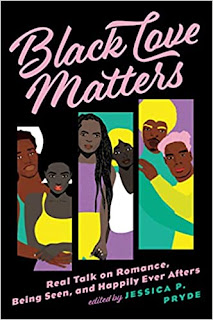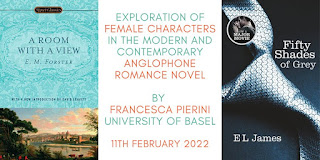Coming up on the 14th is a colloquium which will be streamed live. "Figuraciones del chico malo: género, deseo y poder en narrativas románticas populares.
Lunes 14 de febrero de 2022, 10:00-16:00"
One of the papers is
“El ‘chico malo’ en la novela romántica paranormal post-9/11 en Estados Unidos”
MARÍA T. RAMOS GARCÍA Universidad Estatal de Dakota del Sur
It will stream live here. More details here. I've been told that it will remain available afterwards, so I'll post a link to that later, in a different post.
The other event is one I only found out about recently, it's in Australia, and it's on the 10th. I'm hoping I've got this up before it starts but I'm really unclear about the impact of the time difference.
Will You Be My Valentine?: Romance, Love, and Lust in Popular Culture
Join us on the 10th of February 2022 for our free online symposium exploring the many ways love is represented in popular culture.
Keynote: Dr Jodi McAlister, Deakin University
It’s Not You, It’s Me: Breaking Up in Popular Culture
To register for attendance please send an email to popcrn@une.edu.au. Programme and book of abstracts are available here.
Two of the papers are:
Happy Objects: The Pleasures of Reading the Romance
Nattie Golubov, Universidad Nacional Autónoma de México
This paper argues that popular romance novels actively participate in the circulation of “happy objects” in two senses: they promise happiness as one outcome of the reading experience, on the one hand, while, on the other, they contribute to the circulation of affect by attaching the promise of happiness to certain objects which, in turn, connect to ideas and values. This affective work is accomplished through the use of literary techniques such as the familiar plot structure, the happy ending, the use of cliché and stereotype which I read as features with affordances conducive to a pleasurable reading experience. Based upon the work of new formalists such as Rita Felski and Caroline Levine and Sara Ahmed’s notion of the happy object, I argue that these formal elements incite an embodied type of reading. Contrary to much reader reception theory which dismisses the affective reaction of readers, I argue that (re)reading the romance is a positive, desirable experience because it is embodied, a style of reading that readers expect and unashamedly enjoy.
‘Love Conquers All’?: Race, Bridgerton, and the Romance Writers of America
Lisa J. Hackett, University of New England
Netflix’s historical romance Bridgerton (2020 - ) was notable for its colour-diverse cast. The show, however, has drawn a lot of criticism for the way it handled race within the context of the British aristocracy of Regency London. In episode 4, “An Affair of Honour” the position of persons of colour is explicitly discussed between Lady Danbury and Simon, the Duke of Hastings, both themselves characters of colour. Lady Danbury holds that the transformation of status came about because of
love, specifically that of the King for his Queen, a woman of colour: “love conquers all”. Simon demurs, they are elevated due to the King’s whim, and this can easily be reversed: “love changes nothing”.
While much has been made of the intersection between #BlackLivesMatter and the depictions of persons of colour in shows such as Bridgerton, in this paper I argue that depictions of Characters of Colour occupy a tenuous position within the genre of Historical Romance Novels. Bridgerton aired during a time when one of the biggest organisations devoted to the production of romance, the Romance Writers of America (RWA), was grappling with the issue of diversity. This paper compares the reception of Bridgerton with the events within the RWA. Through examining the events of the RWA from the Courtney Milan affair (2019), when the organisation imploded due to diversity issues, through to the controversy of the 2021 Vivian awards, this paper demonstrates that the current elevated position of characters of colour is held tenuously and more needs to be done to strengthen their existence within the world of Historical Romance.

